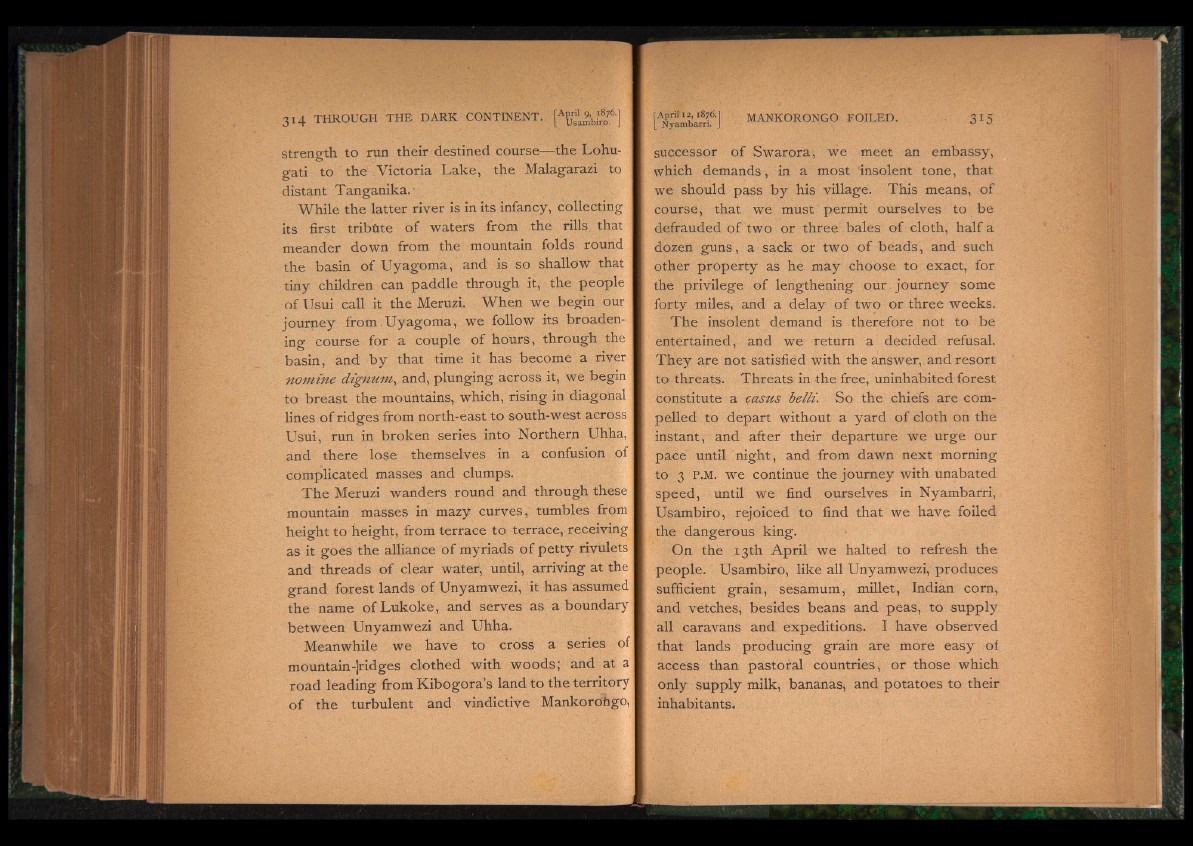
strength to run their destined course— the Lohu-
gati to the Victoria L a k e , the Malagarazi to j
distant Tanganika.-
While the latter river is in its infancy, collecting
its first tribute o f waters from the rills that
meander down from the mountain folds round
the basin of U y a gom a , and is so shallow that
tiny children can paddle through it, the people
o f Usui call it the Meruzi. When we begin our
journey from. U y a gom a , we follow its broadening
course for a couple o f hours, through the
basin, and b y that time it has become a river
nom ine dignum^ and, plunging across it, we begin
to breast the mountains, which, rising in diagonal
lines o f ridges from north-east to south-west across
Usui, run in broken series into Northern Uhha,
and there lose themselves in a confusion of
complicated masses and clumps.
The Meruzi wanders round and through these
mountain masses in mazjl curves, tumbles from
height to height, from terrace to terrace, receiving
as it goes the alliance o f myriads o f p etty rivulets
and threads o f clear water, until, arriving at the
grand forest lands o f Unyamwezi, it has assumed
the name o fL u k o k e , and serves as a boundary
between Unyamwezi and Uhha.
Meanwhile we have to cross a series of
mountain-Jridges clothed with woods; and at a
road leading from K ib o go ra ’s land to the territory
o f the turbulent and vindictive Mankordhgo,
successor o f Swarora, we meet an embassy,
which demands, in a most ‘insolent tone, that
we should pass b y his village. This means, o f
course, that we must permit ourselves to be
defrauded o f two or three bales o f cloth, half a
dozen guns, a sack or two o f beads, and such
other property as he may choose to exact, for
thè privilege o f lengthening our journey some
forty miles, and a delay o f two or three weeks.
T h e insolent demand is therefore not to be
entertained, and we return a decided refusal.
T h e y are not satisfied with the answer, and resort
to threats. Threats in the free, uninhabited forest
constitute a casus belli. So the chiefs are compelled
to depart without a yard o f cloth on the
instant, and after their departure we urge our
pace until night, and from dawn next morning
to 3 P.M. we continue the journey with unabated
speed, until we find ourselves in Nyambarri,
Usambiro, rejoiced to find that we have foiled
the dangerous king.
On the 13th A p r il we halted to refresh the
people. Usambirò, like all Unyamwezi, produces
sufficient grain, sesamum, millet, Indian corn,
and vetches, besides beans and peas, to su p ply
all caravans and expeditions. I have observed
that lands producing grain are more easy of
access than pastoral countries, or those which
only supply milk, bananas, and potatoes to their
inhabitants.